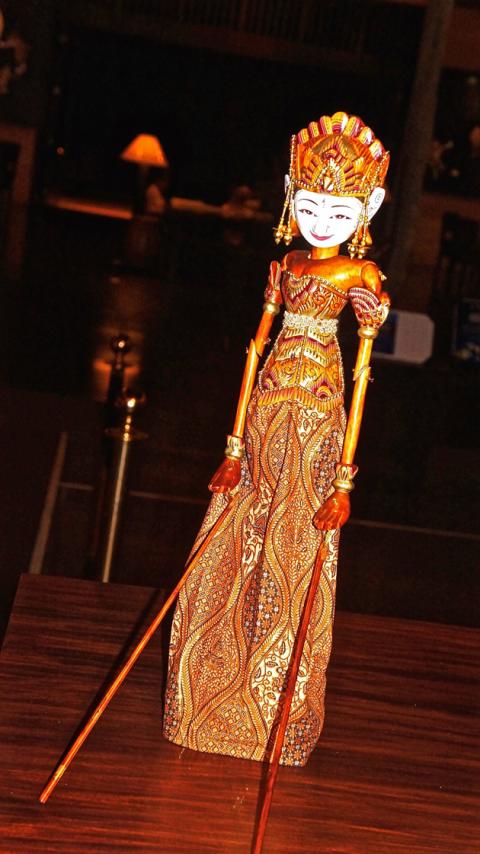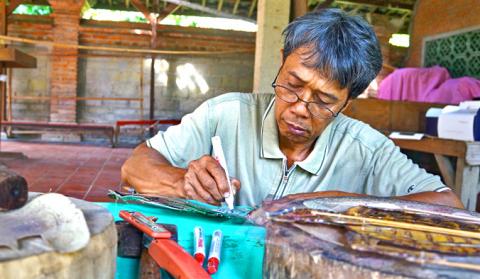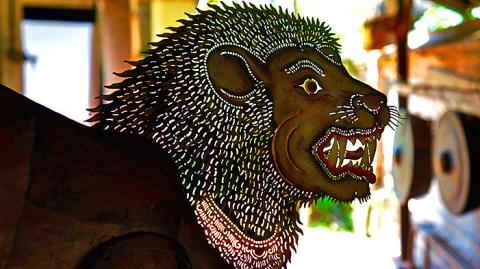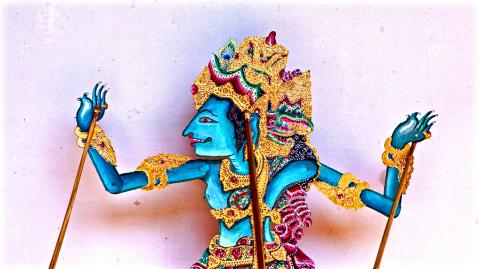At shadow puppet master I Wayan Wija’s leafy courtyard home in Ubud there is a huge chest filled with cutout figures he has made over the past 50 years. They lie there waiting for him to bring them back to life, silhouetted against a translucent cotton white screen, illuminated by a coconut-husk lamp. When he does so the reanimated bird flies, the dinosaur thunders across the tableau and the audience is in raptures.
It has ever been thus for Wijia and his family of puppeteers in Bali, Indonesia, stretching back to his great grandfather. Today, he is in a philosophical frame of mind, as he holds court and explains his craft to a group of tourists, showing them how he creates his crazy cutout figures from calf, buffalo hide and even glass.
Wayang kulit (literally “shadow skin” in Indonesian) is not only part of the world’s heritage, recognized by its UNESCO listing as an Intangible Cultural Heritage of Humanity, it’s also part of the religious and social fabric of the island. Unlike the rest of Indonesia, which is predominantly Muslim, Balinese follow a unique form of Hinduism that includes the belief that animals, plants and inanimate objects have spirits, ancestor worship and reverence for the Buddha.

Photo: Jules Quartly
SOUL OF THE COMMUNITY
The puppet master, or dalang, is an important figure in the community, not just an entertainer. He is a religious leader and propaganda chief, someone who finds, “a simple way of presenting complicated truths, especially to the young and old,” is how Wijia puts it, as he begins work on a new shadow puppet.
“Educating, entertaining and fixing misconceptions,” he adds.

Photo: Jules Quartly
This means passing on stories from the Ramayana and Mahabharata on an almost nightly basis, at weddings, funerals and religious ceremonies.
“The Hindu religion says we all have talent, but we need to find it. Mine is passing on tradition as a form of entertainment. It is an art to make something interesting. And when you have the hearts of the people you are their leader and it is easy to pass on advice,” he says.
It’s not an oft-expressed thought in this enlightened smartphone age, but Wijia insists tradition is a form of progress. Forget the past and you are bound to repeat it, he says loosely paraphrasing George Santayana in The Life of Reason. He is well aware that the world is changing and many givens are gone. While he started learning his craft from his father at 11, he is not sure that his daughters will carry on the tradition — besides which puppet masters are usually men.

Photo: jules quartly
“When my father was alive it was a simpler life compared with now, when there are so many distractions in the material world. Young people don’t care so much for books and philosophy, they look at (social media). They think they know it all but actually there’s knowledge and there’s understanding. They’re different things. And for a spiritual life you don’t need so much knowledge because the truth is simple.”
As he talks Wijia draws a figure on a transparency sheet, transfers this to the leather and cuts out the shape, before using a hammer chisel to carve holes of various arcs that emphasize the figure’s contours. Then the wings, arms and other appendages are fashioned and attached with monofilament or rivets. The leather is then sanded smooth, primed for painting and colored according to a four-shades technique, before the final step of applying gold leaf. It takes about three days to create a puppet.
EMOTIONAL SPECTACLE

Photo: Jules Quartly
Come time for the performance the flat figures are brought to life by bamboo rods attached to the puppet and articulated by the master. The puppets are held up to and away from the screen to present a three-dimensional shadow image rather than a flat appearance. Meanwhile, the gamelan orchestra provides a sonic landscape of gongs, cymbals and wails for the unfolding story. It’s an intensely colorful and emotional spectacle, which can go on all night long.
Though describing himself as a traditionalist, within shadow puppet circles Wijia is known for being a bit of a reformer, having pioneered wayang tantri, a fable approach to storytelling for which he created new animal puppets like giant dinosaurs. He is keen on using simple technology like electric lights rather than lamps to illuminate his scenes.
He’s also knowledgeable about puppet traditions elsewhere, having extensively traveled around the world to perform. He says the Taiwanese tradition of glove puppetry, or budaixi (布袋戲), has evolved to the point where it has become something else, with all its fireworks, explosions and special effects.
This is particularly true of Pili Multinational Media (大霹靂國際整合行銷), which mimes the Hollywood experience by “following the current trends of modern society and technological media,” according to its Web site. It emphasizes “revolutionary filming techniques, high-budgets and advanced special effects production” and an “international perspective and managing concept.”
It’s a stretch for Wijia, who is all for new audiences but not at the expense of the “spirit” of puppetry. Such ventures are “external” or superficial, he says. “I think we should adopt the use of new ideas and technology but not lose the point of the play. I believe new things become old. Everything is a wave, it comes and goes.”
WORKSHOPS
But Bali isn’t Taiwan and wayang kulit isn’t just entertainment or a purely commercial venture. It provides religious information, education, art and is an important tourist attraction. For instance, many of the better hotels stage performances, present shadow puppet artworks in their galleries, and introduce the work of masters through workshops.
The Conrad Bali’s general manager Jean-Sebastien Kling says the hotel’s “Masters Series” connects guests to the heritage and everyday life of the island.
“With this series we are able to provide visitors with greater understanding of unique customs and beliefs through the eyes of true masters of their craft,” Kling says.
Wijia certainly is not that worried about the future of shadow puppetry, saying it is better to live in the present.
“People forget about the now. They only think of the future, but that never comes,” Wijia says.
Of course, on the magical isle of Bali, with its sunsets, beaches and close to 4 million tourist arrivals annually, it is easy to be sanguine.
For Wijia, life is a puppet show, with God as the puppet master and truth in the shadows. “Everything we create is created by ourselves. We should take care that we use the mind, rather than be used by the mind. Don’t be misled by illusion.”
If you go
Flight/arrival information
■ Taipei to Bali costs from NT$8,750 return
■ Visa on arrival is available to nationals from more than 60 countries, including Taiwan. The cost is US$35, and is for 30 days. It can be extended for a further 30 days
■ Departure tax no longer applies
Things to do
■ I Ketut Sudiana, one of Indonesia’s most famous puppet masters, has a display of his artworks at Conrad Bali until June 30
■ The Conrad Bali is also running workshops at I Wayan Wijia’s home for US$50, including refreshments and a day trip to Ubud. On the Net: news.conradhotels.com/bali

June 2 to June 8 Taiwan’s woodcutters believe that if they see even one speck of red in their cooked rice, no matter how small, an accident is going to happen. Peng Chin-tian (彭錦田) swears that this has proven to be true at every stop during his decades-long career in the logging industry. Along with mining, timber harvesting was once considered the most dangerous profession in Taiwan. Not only were mishaps common during all stages of processing, it was difficult to transport the injured to get medical treatment. Many died during the arduous journey. Peng recounts some of his accidents in

“Why does Taiwan identity decline?”a group of researchers lead by University of Nevada political scientist Austin Wang (王宏恩) asked in a recent paper. After all, it is not difficult to explain the rise in Taiwanese identity after the early 1990s. But no model predicted its decline during the 2016-2018 period, they say. After testing various alternative explanations, Wang et al argue that the fall-off in Taiwanese identity during that period is related to voter hedging based on the performance of the Democratic Progressive Party (DPP). Since the DPP is perceived as the guardian of Taiwan identity, when it performs well,

A short walk beneath the dense Amazon canopy, the forest abruptly opens up. Fallen logs are rotting, the trees grow sparser and the temperature rises in places sunlight hits the ground. This is what 24 years of severe drought looks like in the world’s largest rainforest. But this patch of degraded forest, about the size of a soccer field, is a scientific experiment. Launched in 2000 by Brazilian and British scientists, Esecaflor — short for “Forest Drought Study Project” in Portuguese — set out to simulate a future in which the changing climate could deplete the Amazon of rainfall. It is

The Taiwan People’s Party (TPP) on May 18 held a rally in Taichung to mark the anniversary of President William Lai’s (賴清德) inauguration on May 20. The title of the rally could be loosely translated to “May 18 recall fraudulent goods” (518退貨ㄌㄨㄚˋ!). Unlike in English, where the terms are the same, “recall” (退貨) in this context refers to product recalls due to damaged, defective or fraudulent merchandise, not the political recalls (罷免) currently dominating the headlines. I attended the rally to determine if the impression was correct that the TPP under party Chairman Huang Kuo-Chang (黃國昌) had little of a